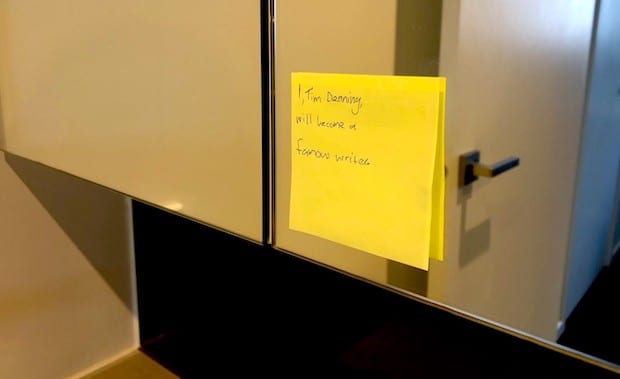Life
Why Successful People Are Not Hippies When They Practice Meditation

For many years, I believed that meditation was for hippies or people that practiced the Buddhist faith. I turned down multiple opportunities to understand just how powerful meditation was. It was only when apps such as “Calm” and “Headspace” came out that I truly understood the power of meditation.
For me, I chose to use the Calm app and have been a subscriber for a while now. Until I had someone guiding me, I never quite knew how to practice meditation even though I was able to read about it. The apps that taught meditation made it accessible to so many more people.
I then began to read blogs and listen to podcasts that all spoke so highly about meditation. It seemed that there wasn’t a lot of successful people who didn’t practice meditation. Then an even more bizarre thing happened to me; I added someone on LinkedIn who ran a business called “Mr. Meditate.”
He told me of his former job working closely with lawyers and how they were all suffering from the effects of anxiety and stress. He then asked me if I would give him a testimonial to talk about the benefits of meditation in my own life and to encourage large organisations to pay for staff meditation.
Before I knew it, I became a sort of pin-up boy for meditation, and I have now shared with lots of people why meditation is not for hippies, and how everyone should practice it.
Here are six benefits you will get from meditation:
1. You can deal with major fear
Fear can destroy our goals and hold us back from success. Whether it’s public speaking or flying on planes that have caused a degree of fear in me, I have always used meditation as a cure. Before you embark on a fearful task, you should try meditating beforehand.
What meditation does is calm your mind down and relax you. Meditation also teaches you how to breathe and just how powerful the breath can be. No matter how sick I feel, I know I can always calm myself down with long, slow, deep breaths.
Breathing is literally the antidote to so many challenges in life, and it’s the reason why when you are nervous, people tell you to breathe. It’s an age old saying that we all say to each other but meditation will help show you just why breathing is so important.
2. You can return to now
Mental disorders like depression and anxiety are caused by a mind that either lives too much in the future or too much in the past. One of meditations benefits is that it can bring your mind back to now. The healthiest place for your mind to think from is the here and now. When you return to now your mind begins to settle down and focus on what you can change in the present.
3. You’ll increase your energy levels
As I began to write this blog post I started to feel a bit sleepy. As someone who doesn’t like to waste time and wants to spend as many hours on my passion as possible, I pulled out the iPhone Calm app. With only ten minutes of meditation, my energy levels were restored. Without meditation, you may not have got to read this post.
Meditation is proven to give you a much better rest than sleep. The beauty of meditation is that you don’t need to do long sessions. 10-15 minutes can often be enough to completely rejuvenate you.
All you need to do is bring your mind back to the present for even a few moments, and the effect can be game changing. I love to add a cup of green tea at the end of my meditation to truly recharge my brain so try doing the same and see if it helps you too.
4. You can have a break from self-talk
Self-talk can drive your mind crazy and take away a lot of your energy and time. Often my own self-talk is spent acting out how I would say something to someone or responding to a negative situation. When I get stuck in these thought patterns, I find that time passes really quickly.
Meditation will allow you to take a break from all the mind chatter and live with a head full of nothing for a bit. A head full of nothing can then begin to pull new ideas in because there is room for them without the self-talk.
Too much self-talk will not allow your positive thoughts to grow properly over time which will, in turn, limit your likelihood of success. Use meditation to change this paradigm and you will see just how beneficial a clear mind can be.
5. You’ll gain more control
It’s so easy for your life to become out of control. Control comes when you begin to be conscious of everything that is going on in your world. Meditation helps highlight all of your thoughts and just how out of control they can be.
It’s hilarious to me sometimes when I try and meditate, and I can’t focus for a minute without thoughts forcing their way into my head. This is normal when meditating and some days you will be in control, and other days your thoughts will dictate the entire session.
The more you practice meditation, the more in control you become of your life.
6. You’re calmer
I often associate the feeling of being calm with being in a tranquil spot of nature such as The Great Barrier Reef. What meditation does so well is calm you right now in the moment and bring you into a non-reactive state of thinking.
Many of us live our life just reacting to everything that is thrown in front of us and by meditating we can change this reality. When the mind is calm, our thoughts become more pure, and we can soak our thinking with an influx of positivity.
Living in a calm state of mind is a way of life for me now. If you have never got to live in a calm state, then I empower you to make this a must in your life. Meditating will start the process of being more calm, but it’s up to you to carry the feeling on through the way you choose to live your life.
Everything you do each day is a choice. Success is about making smarter choices and meditation is one of those choices. Try it, embrace it, and enjoy what it feels like to calm your mind / life right down.
***My meditation tips***
- Try to practice meditation every single day for no less than ten minutes. If you only do it once in a while, you won’t get the growth that regular meditation can give you.
- Use an app to guide you through the process. Apps often have good instructions and relaxing background sounds that help deepen the meditation experience.
- If you’re really hopeless at meditation, then try getting a coach or attending a meditation class. Sometimes it’s your environment that is stopping you from practicing meditation correctly.
- Sit up straight with your feet flat on the floor. Lying down while meditating can make you fall asleep and you won’t be truly present.
- As suggested before, drink a nice warm cup of green tea (or any tea) straight after your meditation session.
- If you fly a lot like me, use the time on the plane to meditate. For long flights, try a whole hour of meditation. A longer session is an entirely different experience.
- Share the benefits of meditation with other people you know and get the word out there.
Have you tried meditation? How has it helped you? Let me know in the comments section below or on my website timdenning.net and on my Facebook.
Did You Know
How Skilled Migrants Are Building Successful Careers After Moving Countries
Behind every successful skilled migrant career is a mix of resilience, strategy, and navigating systems built for locals.

Moving to a new country for work is exciting, but it can also be unnerving. Skilled migrants leave behind familiar systems, networks, and support to pursue better job opportunities and a better future for their families. (more…)
Life
10 Research-Backed Steps to Create Real Change This New Year
This New Year could finally be the one where you break old patterns and create real, lasting change.

Every New Year, we make plans and set goals, but often repeat old patterns. (more…)
Life
9 Harsh Truths Every Young Man Must Face to Succeed in the Modern World
Before chasing success, every young man needs to face these 9 brutal realities shaping masculinity in the modern world.

Many young men today quietly battle depression, loneliness, and a sense of confusion about who they’re meant to be.
Some blame the lack of deep friendships or romantic relationships. Others feel lost in a digital world that often labels traditional masculinity as “toxic.”
But the truth is this: becoming a man in the modern age takes more than just surviving. It takes resilience, direction, and a willingness to grow even when no one’s watching.
Success doesn’t arrive by accident or luck. It’s built on discipline, sacrifice, and consistency.
Here are 9 harsh truths every young man should know if he wants to thrive, not just survive, in the digital age.
1. Never Use Your Illness as an Excuse
As Dr. Jordan B. Peterson often says, successful people don’t complain; they act.
Your illness, hardship, or struggle shouldn’t define your limits; it should define your motivation. Rest when you must, but always get back up and keep building your dreams. Motivation doesn’t appear magically. It comes after you take action.
Here are five key lessons I’ve learned from Dr. Peterson:
-
Learn to write clearly; clarity of thought makes you dangerous.
-
Read quality literature in your free time.
-
Nurture a strong relationship with your family.
-
Share your ideas publicly; your voice matters.
-
Become a “monster”, powerful, but disciplined enough to control it.
The best leaders and thinkers are grounded. They welcome criticism, adapt quickly, and keep moving forward no matter what.
2. You Can’t Please Everyone And That’s Okay
You don’t need a crowd of people to feel fulfilled. You need a few friends who genuinely accept you for who you are.
If your circle doesn’t bring out your best, it’s okay to walk away. Solitude can be a powerful teacher. It gives you space to understand what you truly want from life. Remember, successful men aren’t people-pleasers; they’re purpose-driven.
3. You Can Control the Process, Not the Outcome
Especially in creative work, writing, business, or content creation, you control effort, not results.
You might publish two articles a day, but you can’t dictate which one will go viral. Focus on mastery, not metrics. Many great writers toiled for years in obscurity before anyone noticed them. Rejection, criticism, and indifference are all part of the path.
The best creators focus on storytelling, not applause.
4. Rejection Is Never Personal
Rejection doesn’t mean you’re unworthy. It simply means your offer, idea, or timing didn’t align.
Every successful person has faced rejection repeatedly. What separates them is persistence and perspective. They see rejection as feedback, not failure. The faster you learn that truth, the faster you’ll grow.
5. Women Value Comfort and Security
Understanding women requires maturity and empathy.
Through books, lectures, and personal growth, I’ve learned that most women desire a man who is grounded, intelligent, confident, emotionally stable, and consistent. Some want humor, others intellect, but nearly all want to feel safe and supported.
Instead of chasing attention, work on self-improvement. Build competence and confidence, and the rest will follow naturally.
6. There’s No Such Thing as Failure, Only Lessons
A powerful lesson from Neuro-Linguistic Programming: failure only exists when you stop trying.
Every mistake brings data. Every setback builds wisdom. The most successful men aren’t fearless. They’ve simply learned to act despite fear.
Be proud of your scars. They’re proof you were brave enough to try.
7. Public Speaking Is an Art Form
Public speaking is one of the most valuable and underrated skills a man can master.
It’s not about perfection; it’s about connection. The best speakers tell stories, inspire confidence, and make people feel seen. They research deeply, speak honestly, and practice relentlessly.
If you can speak well, you can lead, sell, teach, and inspire. Start small, practice at work, in class, or even in front of a mirror, and watch your confidence skyrocket.
8. Teaching Is Leadership in Disguise
Great teachers are not just knowledgeable. They’re brave, compassionate, and disciplined.
Teaching forces you to articulate what you know, and in doing so, you master it at a deeper level. Whether you’re mentoring a peer, leading a team, or sharing insights online, teaching refines your purpose.
Lifelong learners become lifelong leaders.
9. Study Human Nature to Achieve Your Dreams
One of the toughest lessons to accept: most people are self-interested.
That’s not cynicism, it’s human nature. Understanding this helps you navigate relationships, business, and communication more effectively.
Everyone has a darker side, but successful people learn to channel theirs productively into discipline, creativity, and drive.
Psychology isn’t just theory; it’s a toolkit. Learn how people think, act, and decide, and you’ll know how to lead them, influence them, and even understand yourself better.
Final Thoughts
The digital age offers endless opportunities, but only to those who are willing to take responsibility, confront discomfort, and keep improving.
Becoming a man today means embracing the hard truths most avoid.
Because at the end of the day, success isn’t about luck. It’s about who you become when life tests you the most.
Change Your Mindset
The Four Types of Happiness: Which One Are You Living In?
Most people chase success only to find emptiness, this model reveals why true happiness lies somewhere else.

In a world driven by rapid technological growth and constant competition, many people unknowingly trade joy for achievement. (more…)
-

 Health & Fitness2 weeks ago
Health & Fitness2 weeks agoWhat Minimalism Actually Means for Your Wellness Choices
-

 News1 week ago
News1 week agoBrandon Willington Builds 7-Figure Business by Ignoring Almost Everything
-

 Did You Know2 weeks ago
Did You Know2 weeks agoWhy Most Online Courses Fail and How to Fix Them
-

 Business2 weeks ago
Business2 weeks agoIf Your Business Internet Keeps Letting You Down, Read This
-

 Business14 hours ago
Business14 hours agoEntrepreneur’s Guide to Pay Stubs: Why Freelancers and Small Business Owners Need a Smart Generator



















8 Comments